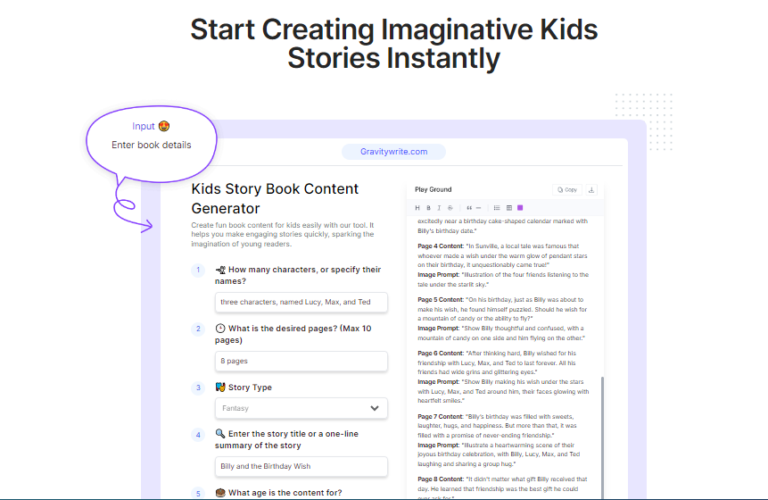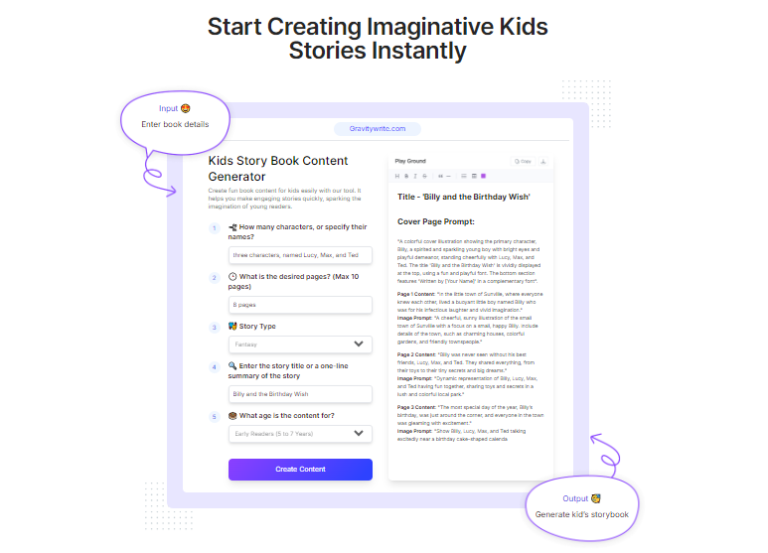A comprehensive guide on writing a book about your life, covering essential steps, tips, and frequently asked questions. Learn how to transform your experiences into a captivating memoir.
Introduction
Embarking on the journey of writing a book about your life can be both exhilarating and daunting. It’s an opportunity to delve deep into your experiences, share your unique perspective, and leave a lasting legacy. This comprehensive guide will equip you with the knowledge and tools to transform your life story into a captivating memoir.
Watch How GravityWrite Creates Books in Seconds!
Get Started With GravityWrite Today!
Part I: Planning Your Memoir
Finding Your Story’s Core
- Discovering Your Theme: Identify the central message or theme you want to convey through your memoir. This could be a lesson learned, a personal transformation, or a universal experience.
- Defining Your Purpose: Determine why you want to write your memoir and what you hope to achieve. Are you seeking closure, sharing your wisdom, or simply preserving your memories for future generations?
Creating a Compelling Structure
- Choosing a Narrative Structure: Decide whether you’ll use a chronological, thematic, or flashback structure. Consider which approach best suits your story and the message you want to convey.
- Outlining Your Story: Develop a detailed outline to organize your thoughts and ensure a cohesive flow. Break down your story into chapters or sections, and outline the key events or themes within each.
Gathering Your Materials
- Collecting Memories: Jot down your memories, anecdotes, and significant events. Consider using journaling prompts, mind mapping, or freewriting techniques to spark your creativity.
- Interviewing Others: Talk to friends, family, and acquaintances who can provide additional insights or perspectives. Record your interviews to capture their stories accurately.
- Documenting Your Life: Gather photographs, letters, journals, and other relevant materials. These artifacts can add depth and authenticity to your memoir.
Part II: Crafting Your Memoir
Developing Engaging Characters
- Showcasing Your Personality: Bring yourself to life on the page by revealing your thoughts, feelings, and actions. Use vivid descriptions and anecdotes to paint a picture of who you are.
- Creating Memorable Characters: Develop well-rounded characters who contribute to your story’s depth. Consider the relationships between characters and how they influence your narrative.
Writing Vivid Scenes
- Using Sensory Details: Paint a picture for your readers by incorporating sight, sound, smell, taste, and touch. The more sensory details you include, the more immersive your writing will be.
- Showing, Not Telling: Use vivid descriptions and dialogue to convey your experiences. Avoid simply stating facts and instead show readers what happened through your words.
Incorporating Conflict and Resolution
- Identifying Your Story’s Conflict: Introduce a central conflict that drives your narrative forward. This could be an internal struggle, a conflict with others, or an external challenge.
- Resolving the Conflict: Offer a satisfying resolution that ties up loose ends and leaves a lasting impression. The resolution should align with the theme of your memoir and provide a sense of closure.
Adding Depth and Nuance
- Using Symbolism: Employ symbolic elements to enhance your story’s meaning. For example, a recurring object or image could represent a particular emotion or theme.
- Exploring Themes: Delve into deeper themes that resonate with your readers. Consider themes such as love, loss, resilience, or self-discovery.
Part III: Polishing Your Memoir
Revising and Editing
- Seeking Feedback: Share your work with trusted readers and incorporate their suggestions. Consider joining a writing group or hiring a professional editor for feedback.
- Eliminating Clutter: Cut unnecessary words and phrases to improve clarity and conciseness. Focus on using strong, active verbs and avoiding passive voice.
Ensuring Accuracy and Authenticity
- Fact-Checking: Verify the accuracy of your information and correct any errors. Consult reliable sources and cross-reference your information.
- Preserving Authenticity: Maintain the integrity of your experiences while considering the sensitivities of others. Be mindful of privacy concerns and avoid disclosing information that could harm others.
Finding Your Voice
- Developing Your Writing Style: Find your unique voice and let it shine through your writing. Experiment with different styles and tones until you find what feels most natural.
- Maintaining Consistency: Use consistent language, tone, and style throughout your memoir. This will help create a cohesive and engaging reading experience.
Get Started With GravityWrite Today!
Part IV: Publishing Your Memoir
Choosing a Publishing Path
- Traditional Publishing: Explore opportunities with literary agents and publishing houses. Research agents who specialize in memoirs and submit your query letter and manuscript.
- Self-Publishing: Consider self-publishing platforms and distribution channels. Self-publishing gives you more control over the process but requires marketing and promotion efforts.
- Hybrid Publishing: Evaluate hybrid publishing options that combine elements of traditional and self-publishing. These options offer services like editing, design, and distribution, but you retain ownership of your work.
Marketing and Promoting Your Memoir
- Building an Author Platform: Create a website, social media presence, and email list. Use these platforms to connect with readers and promote your memoir.
- Engaging with Readers: Connect with your target audience through book signings, events, and online interactions. Participate in book clubs, author meet-ups, and online forums.
Overcoming Obstacles and Challenges
- Dealing with Writer’s Block: Develop strategies to overcome creative hurdles. Take breaks, try different writing techniques, or seek inspiration from other sources.
- Managing Self-Doubt: Build confidence in your abilities and persevere through challenges. Remember that writing is a process, and it takes time to develop your skills.
Frequently Asked Questions (FAQs) about Writing a Memoir
Do I need to have a writing background to write a memoir?
No, you don’t need formal writing experience. Your passion for sharing your story is the most important ingredient.
How long should my memoir be?
The length can vary depending on your story and chosen structure. However, aim for a word count that effectively conveys your message.
Can I write about sensitive topics?
Yes, you can write about sensitive topics. Be mindful of your audience and consider using appropriate language and discretion.
How do I protect my privacy?
Consider using pseudonyms for sensitive information or obtaining permission from individuals mentioned in your memoir.
What if I don’t remember everything?
Don’t worry if you can’t recall every detail. Rely on your emotions, memories, and research to fill in the gaps.
How do I overcome writer’s block?
Take breaks, try different writing techniques, or seek inspiration from other sources. Experiment with different writing prompts or exercises to jumpstart your creativity.
What if I’m not sure where to start?
Begin by brainstorming ideas and jotting down your thoughts. Consider starting with a significant event or memory that sets the tone for your story.
How do I know if my memoir is good enough?
Seek feedback from trusted readers and consider hiring a professional editor for guidance. Remember that writing is a process, and your memoir will evolve over time.
How do I find a publisher for my memoir?
Research traditional publishing houses and literary agents who specialize in memoirs. Consider self-publishing platforms or hybrid publishing options as well.
How do I market and promote my memoir?
Build an author platform through social media, a website, and email marketing. Connect with readers through book signings, events, and online communities.
Get Started With GravityWrite Today!
Conclusion
Writing a book about your life is a rewarding journey of self-discovery and expression. By following the steps outlined in this guide, you can transform your experiences into a captivating memoir that resonates with readers. Remember, the most important thing is to be honest, authentic, and true to your story.
Discover more from ZornSoftware
Subscribe to get the latest posts sent to your email.




